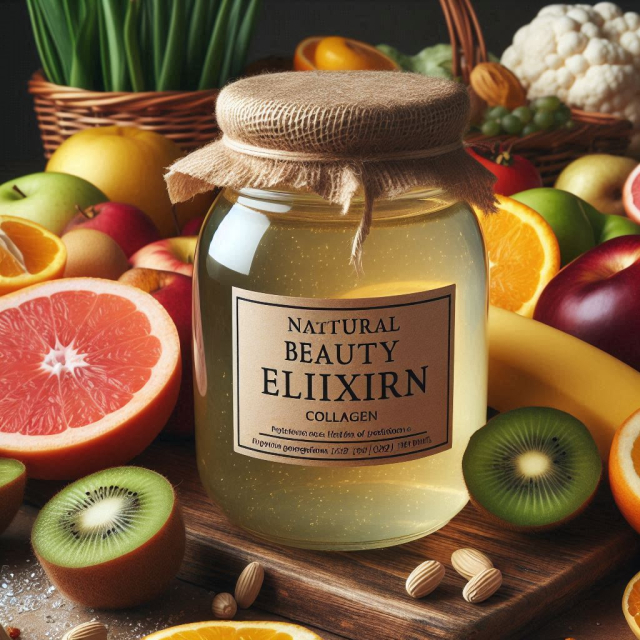Collagen is a fundamental protein in the human body, playing a crucial role in the structure and function of various tissues. From the skin to bones, tendons and cartilage, collagen is essential for maintaining the integrity and elasticity of these components. In this article, we will explore what collagen is, its different types, functions, health and beauty benefits, as well as ways to maintain and improve its production in the body.
What is Collagen?
Collagen is the most abundant protein in the human body, accounting for about 30% of the total protein content. It is composed of amino acids, mainly glycine, proline and hydroxyproline, and is organized into long, thin fibers that provide structure and strength to connective tissues.
Types of Collagen.
There are at least 28 different types of collagen, but the most common are:
- Type I: Found in the skin, tendons, ligaments and bones. It represents 90% of the collagen in the body.
- Type II: Present in cartilage and intervertebral discs.
- Type III: Common in the skin, muscles and blood vessels.
- Type IV: It is part of the basement membranes that surround the cells.
- Type V: Found on cell surfaces and the placenta.
Functions of Collagen.
Collagen has several vital functions in the body:
- Structural: Provides support and shape to tissues, contributing to the structural integrity of the skin, bones, tendons and ligaments.
- Elasticity and Flexibility: Allows connective tissues to be flexible and elastic, which is crucial for joint movement and function.
- Wound Healing: Facilitates the repair of damaged tissues, helping in wound healing and skin regeneration.
- Hydration: Maintains skin hydration, contributing to its softness and youthful appearance.
Benefits of Collagen.
Skin Health.
Collagen is essential to keep the skin firm, elastic and wrinkle-free. With age, collagen production decreases, leading to the appearance of fine lines, wrinkles and sagging. Collagen supplements can help improve skin hydration, reduce wrinkles, and promote a more youthful appearance.
Joint Health.
Type II collagen is essential for the health of cartilage, which acts as a shock absorber in the joints. Collagen supplements may help reduce joint pain, improve mobility, and support cartilage regeneration in people with osteoarthritis and other joint conditions.
Strengthening of the Bones.
Bones are primarily composed of type I collagen, which provides structure and strength. Loss of collagen with age can lead to osteoporosis and bone fragility. Collagen supplements can help maintain bone density and reduce the risk of fractures.
Hair and Nail Health.
Collagen also plays a role in the strength and growth of hair and nails. Collagen supplements can improve hair quality, reduce breakage, and promote the growth of stronger, healthier nails.
Sources of Collagen.
Collagen can be obtained from various sources, both food and supplements.
Food Sources.
- Bone Broth: Rich in collagen, minerals and essential amino acids.
- Meats and Fish: Especially in parts that contain connective tissues, such as skin and cartilage.
- Eggs: The membrane surrounding the shell is rich in collagen.
- Dairy Products: They contain proteins that can support collagen production.
Collagen Supplements.
Collagen supplements are available in various forms, such as:
- Powders: Easy to add to smoothies, soups and other recipes.
- Capsules: Convenient for those who prefer a quick dosing option.
- Drinks and Gels: Practical formats to consume on the go.
How to Increase Collagen Production.
Diet.
A diet rich in essential amino acids and nutrients can help increase collagen production. Foods rich in vitamin C, such as citrus fruits, peppers and strawberries, are crucial, since vitamin C is necessary for collagen synthesis. Other important nutrients include copper, zinc, and antioxidants that protect against free radical damage.
Lifestyle.
- Hydration: Maintaining adequate water intake is vital for skin health and collagen production.
- Sun Protection: Excessive sun exposure can degrade collagen in the skin. Using sunscreen and avoiding prolonged sun exposure can help preserve collagen.
- Avoid Tobacco: Smoking reduces collagen production and accelerates skin aging.
Supplementation.
Hydrolyzed collagen supplementation has been shown to be effective in improving skin, joint and bone health. Collagen peptides are more easily absorbed by the body and can integrate into tissues more efficiently.
Research and Future of Collagen.
Research on collagen and its benefits continues to advance. Recent studies have explored new sources of collagen, such as genetically modified plants and advanced biotechnologies, to produce high-quality, sustainable collagen. Additionally, medical applications of collagen are being investigated in tissue regeneration, tissue engineering, and anti-aging treatments.
Collagen is an essential protein with a wide range of functions and benefits for health and beauty. From maintaining skin and joint structure to strengthening bones and promoting healthy hair and nails, collagen plays a crucial role in overall well-being. Maintaining a balanced diet, protecting yourself from the sun, avoiding harmful habits, and considering collagen supplementation can help optimize collagen production and levels in the body, contributing to a healthier, more youthful life. Continued research promises exciting new applications for this vital protein, further expanding its positive impact on our lives.






